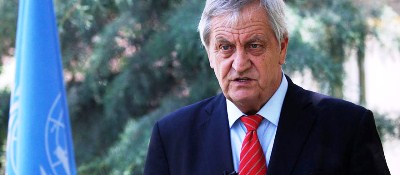Proliferation of weapons, climate change fueling conflict in South Sudan, says U.N official
September 1, 2022 (JUBA) – Proliferation of weapons, lack of economic livelihoods, and climate change are factors fueling conflict in South Sudan, a United Nations official said.
Nicholas Haysom, the head of the United Nations Mission in South Sudan (UNMISS) was addressing the South Sudan National Livestock Conference held in Juba on Thursday.
Vice President James Wani Igga, ministers and several lawmakers graced the conference.
Haysom said unregulated cattle migration, among a host of other factors, were key drivers to communal conflict as well as violence in the East African country.
In the second quarter of 2022, UNMISS’s Human Rights Division reportedly said community-based militias and self-defense groups, whose main objective is to protect herds of cattle from external attack, were in fact responsible for 60% of civilian deaths.
“Unregulated transhumance—the flow of cattle through migration routes—also continues to be a major driver of communal conflict in South Sudan,” stressed Haysom.
He added, “It is not just a domestic phenomenon, but one that crosses regional borders and invokes sensitive issues of ethnic politics, land ownership, borders, grazing rights, and access to water”.
Haysom said prolonged insecurity has led to the erosion of traditional, local, and state authorities.
“And in the absence of dispute resolution, criminal accountability, and justice mechanisms, a culture of impunity has taken root,” he warned. “This sparks vicious cycles of counter raids and retaliatory attacks that, once unleashed, are difficult to quell.”
Livestock, Haysom noted, plays a central role in the fabric of life in the country and that it has been vital to the economy, culture, and social structure of the people of South Sudan even before independence.
“And this is what makes it (livestock) a valuable form of currency and, therefore, both an incentive for both cooperation as well as an incentive for conflict among communities,” he said.
According to the UNMISS head, the consequences of cattle-related violence on inter-communal harmony are devastating and long-lasting, setting up cycles that are difficult to break and undermine progress this country has made towards peace.
“Solutions must go beyond retaliatory dynamics at the surface and look into broader issues of accountability, reconciliation, political inclusion, state effectiveness, development, and the proliferation of arms among the civilian population,” he stressed.
Haysom, also the Special Representative of Secretary General, said UNMISS is providing technical assistance to review draft legislations on livestock management in South Sudan, including the Livestock Bill, Animal Production Bill, Veterinary Bill, Meat Marketing Bill, and Land Act and Policy.
(ST)

